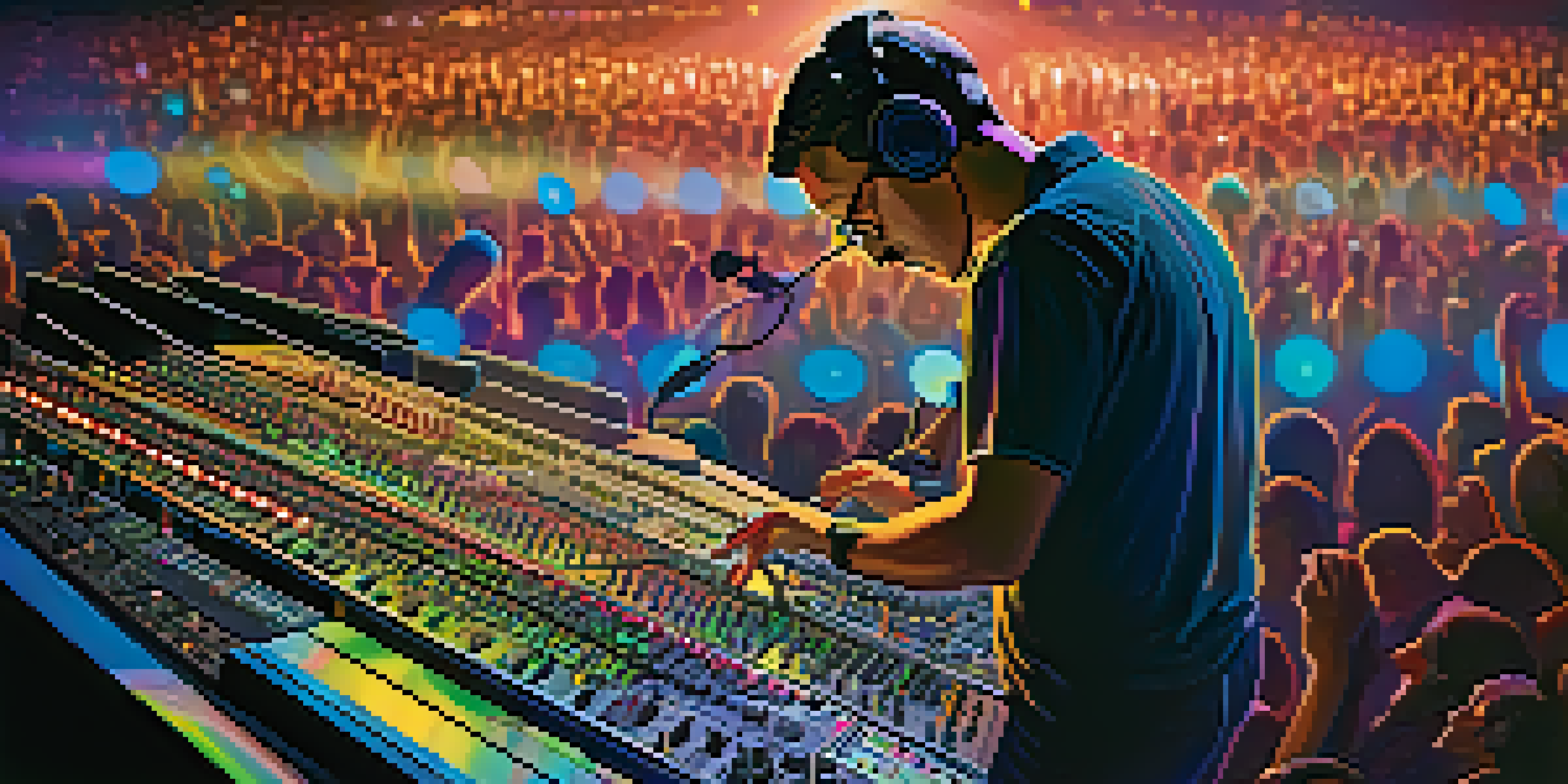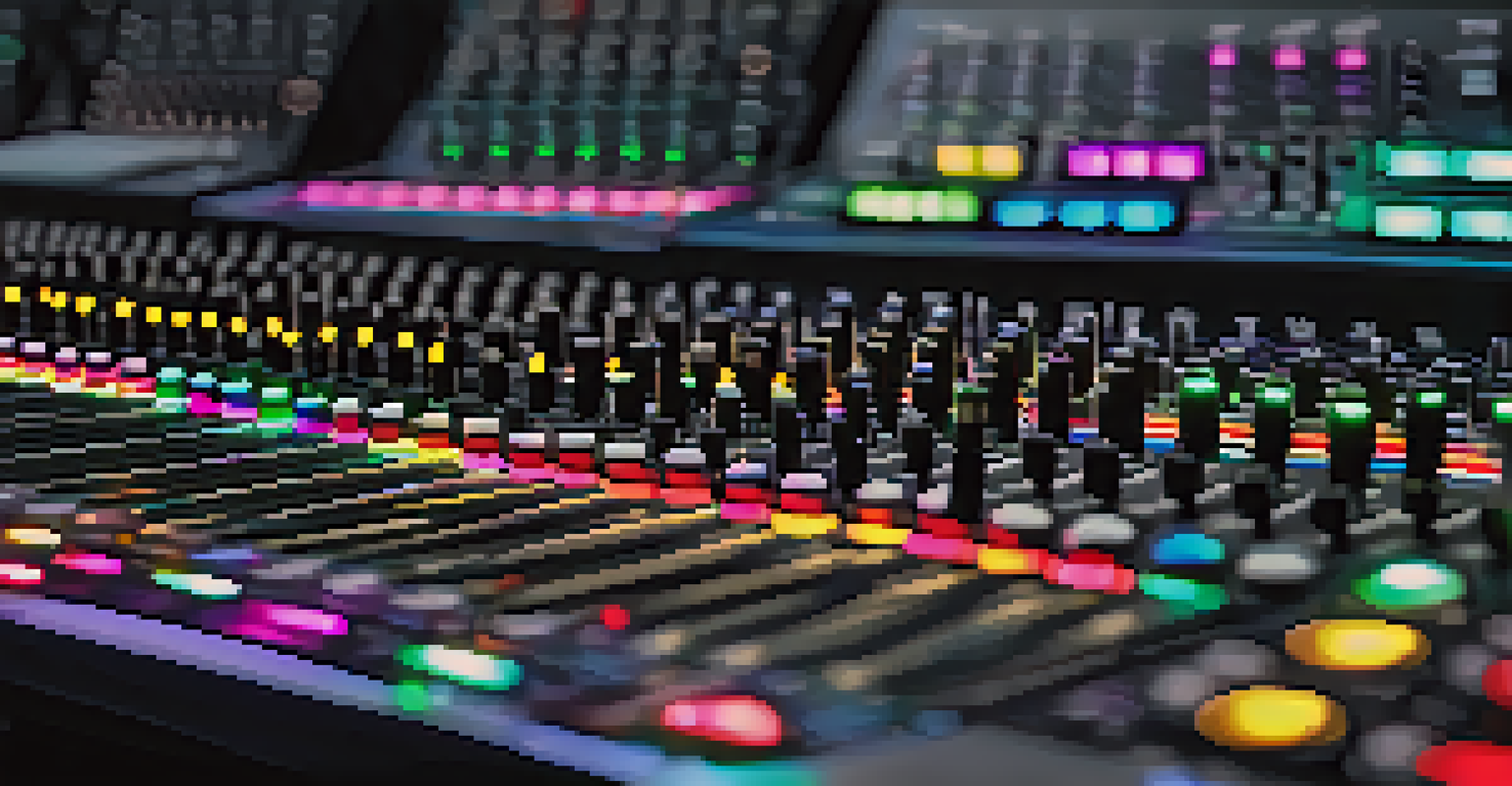Understanding the Role of a Live Sound Engineer in Concerts

What is a Live Sound Engineer and Their Importance?
A live sound engineer is the backbone of any concert, ensuring the audio experience is flawless. They are responsible for mixing sound in real-time, balancing volume levels, and enhancing audio quality. Without a skilled engineer, a concert can quickly turn into a cacophony of dissonance, leaving both artists and audiences disappointed.
The art of sound is the art of listening.
Their role goes beyond just pressing buttons; they must understand the acoustics of the venue and the technical requirements of each performance. Each artist has a unique sound, and the engineer must adapt quickly to bring out the best in their performance. This adaptability is essential for creating a memorable concert experience.
Think of the live sound engineer as the conductor of an orchestra, but instead of musicians, they are working with microphones, speakers, and effects. Their expertise ensures that every note, every lyric, and every beat resonates perfectly with the audience.
Essential Skills of a Live Sound Engineer
To excel as a live sound engineer, one must possess a blend of technical and interpersonal skills. Technical skills include knowledge of audio equipment, sound mixing, and signal processing. An engineer must also be able to troubleshoot problems on the fly, which often means thinking quickly under pressure.

Interpersonal skills are equally important, as a live sound engineer collaborates closely with musicians and production teams. Good communication fosters a positive environment and helps to ensure everyone is on the same page regarding sound preferences. Building strong relationships can lead to more successful events.
Key Role of Live Sound Engineers
Live sound engineers are essential for ensuring a flawless audio experience during concerts, adapting to each artist's unique sound.
Moreover, a keen ear for music and sound is vital. This means being able to discern subtle differences in audio quality and making adjustments that enhance the overall sound. Just like a chef perfects a recipe, a sound engineer refines the audio mix to create the best listening experience.
The Sound Check: A Critical Pre-Show Process
One of the most crucial aspects of a live sound engineer's job is the sound check, which takes place before the audience arrives. This is the time to set levels, adjust equalization, and troubleshoot any potential issues with the audio system. A good sound check can make all the difference in how the performance is received.
Sound is the vocabulary of nature.
During this process, the engineer works closely with the band or artist to capture their desired sound. It's a collaborative effort where adjustments are made based on the musicians' feedback. This ensures that the artists feel comfortable and confident when they hit the stage.
In essence, the sound check is like a rehearsal for the audio experience. It allows the engineer to fine-tune the sound before the spotlight shines, ensuring that the audience hears the performance as it was meant to be heard.
Equipment and Technology Used by Live Sound Engineers
A live sound engineer relies on a variety of equipment and technology to create the desired sound experience. This includes microphones, mixing consoles, speakers, and monitors, each playing a vital role in the audio chain. Understanding the functionality of each piece of gear is crucial for achieving high-quality sound.
Additionally, modern technology has brought advancements like digital mixing boards and software that allow for more intricate control over the sound. Engineers can now save settings, adjust sound remotely, and even utilize effects that enhance the performance. These tools can elevate a concert from good to unforgettable.
Essential Skills Required
A successful live sound engineer combines technical expertise with strong interpersonal skills to collaborate effectively with artists and production teams.
Imagine a painter with a full palette of colors; the engineer's equipment is their palette, enabling them to blend sound in ways that create a rich auditory experience. The right tools in the hands of a skilled engineer can transform a live performance into an immersive event.
Challenges Faced by Live Sound Engineers
Live sound engineers often encounter a range of challenges during concerts, such as unpredictable acoustics and technical malfunctions. Each venue presents its own unique set of hurdles, from echoing sounds to equipment failures. Being prepared for these challenges is part of the job.
Weather can also play a critical role, especially for outdoor concerts. Rain or wind can disrupt sound quality and equipment performance, requiring quick thinking and adaptability. Engineers must remain calm and resourceful in such situations to ensure the show goes on smoothly.
These challenges can be likened to navigating a ship through stormy seas; a skilled engineer must steer the ship with precision and confidence. Their ability to handle obstacles is what ultimately ensures a successful and enjoyable concert experience for everyone involved.
The Role of a Live Sound Engineer During a Performance
During a concert, the live sound engineer is constantly on the move, adjusting sound levels and monitoring audio quality in real-time. They listen intently, making on-the-spot decisions to enhance the sound as the performance unfolds. This dynamic environment requires a keen focus and a quick response to any changes.
In addition to mixing the sound, the engineer also works to ensure that all musicians are able to hear themselves and each other through stage monitors. This is crucial for keeping the performance tight and in sync. The engineer must balance the needs of both the audience and the performers.
Future of Sound Engineering
The evolution of technology, including AI and immersive experiences, is set to transform live sound engineering, presenting new opportunities for creativity.
It's much like being a DJ at a party, where the goal is to keep everyone engaged and energized. The live sound engineer's role is pivotal in creating an atmosphere that captivates the audience, allowing the music to shine through.
The Future of Live Sound Engineering
As technology continues to evolve, the field of live sound engineering is set to change dramatically. Innovations like artificial intelligence and advanced audio processing are making their way into live performances, offering new opportunities for sound engineers. Staying updated with these trends is essential for success in this competitive field.
Additionally, the rise of virtual and augmented reality experiences is also influencing how sound is engineered. Sound engineers may soon find themselves creating immersive soundscapes that enhance virtual performances, reaching audiences in entirely new ways. This will require a blend of creativity and technical know-how.

Ultimately, the future looks bright for live sound engineers, with endless possibilities to explore. As they adapt to new tools and technologies, they will continue to play a vital role in shaping the concert experience, ensuring that music reaches the hearts of audiences everywhere.